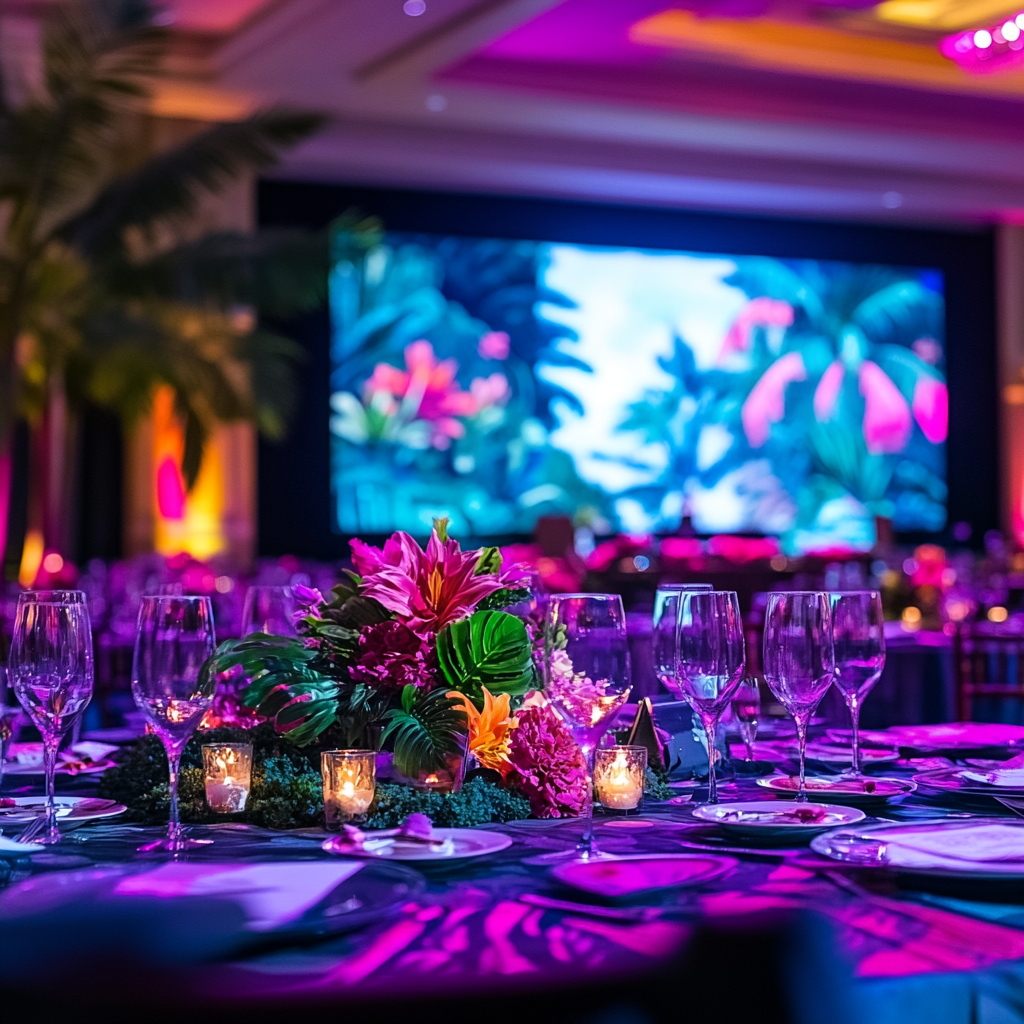Disclosure:
Some of the links on this website are affiliate links, which means that if you click on one of the links and sign up or make a purchase, we may earn a small commission at no additional cost to you. This commission helps support the maintenance and operation of this site.
We only recommend products or services that we believe will provide value to our readers. Our opinions and recommendations are based on our own research and experiences, and we strive to offer honest and unbiased content.
Please note that your support through these affiliate links is greatly appreciated, as it helps us continue to provide quality content and resources.
Thank you for your support!
The entertainment and event industry is a dynamic and exciting field that offers a variety of business opportunities. Whether you enjoy planning events, providing live entertainment, renting out event equipment, or producing digital content, there’s a profitable niche for you. From corporate events and weddings to podcasting and livestreaming, businesses in this space help people create unforgettable experiences.
With the growing demand for unique events, high-quality entertainment, and engaging media content, starting an entertainment and event business can be both fulfilling and financially rewarding. In this guide, we’ll walk you through the essential steps to launch your business successfully.
What Is an Entertainment & Event Business and Why Should You Start One?
What Is an Entertainment & Event Business?
An entertainment and event business involves planning, organizing, or providing services for events, celebrations, and media productions. These businesses cater to individuals, corporations, and organizations looking to host memorable experiences, performances, or digital content.
Types of Entertainment & Event Businesses
- Event Planning: Organizing corporate events, weddings, parties, festivals, and virtual events.
- Event Rentals: Providing party supplies, photo booths, wedding décor, and bounce houses.
- Entertainment Services: Offering live performances, such as DJs, musicians, comedians, and magicians.
- Media Production: Creating digital content through YouTube, podcasting, livestreaming, and vlogging.
Whether you’re planning weddings, hosting concerts, or producing video content, an entertainment and event business can be both profitable and fulfilling.
Why Should You Start an Entertainment & Event Business?
1. Growing Demand for Entertainment & Events
- People always need entertainment and event services for weddings, corporate gatherings, and personal celebrations.
- Digital entertainment, such as livestreaming, podcasting, and YouTube, continues to expand.
2. High Profit Potential
- Event planning and rental businesses can charge thousands per event.
- Entertainers and media producers can monetize through performances, sponsorships, and ad revenue.
3. Flexible Business Models
- Work freelance, start a small agency, or scale into a full-service company.
- Virtual event planning and media production allow remote work opportunities.
4. Creative & Exciting Industry
- If you love music, storytelling, performing, or organizing events, this industry allows you to turn your passion into profit.
- Every event and project is unique, offering constant new experiences.
5. Opportunities for Growth & Networking
- Build long-term partnerships with clients, vendors, and sponsors.
- Social media and online platforms help expand your audience and reach.
Is This the Right Business for You?
- If you enjoy creativity, working with people, and managing experiences, an entertainment and event business can be highly rewarding.
- However, if you struggle with uncertainty, high-pressure deadlines, or seasonal income fluctuations, this industry may be challenging.

Pros and Cons of Starting an Entertainment & Event Business
The entertainment and event industry offers exciting opportunities for entrepreneurs, but like any business, it has its advantages and challenges. Below, we break down the pros and cons based on the different types of businesses: event planning, event rentals, entertainment services, and media production.
Pros of Starting an Entertainment & Event Business
1. High Demand for Services
- Event Planning & Rentals: Weddings, corporate events, parties, and festivals always require planners, rentals, and coordination.
- Entertainment Services: DJs, musicians, and performers are always in demand for celebrations.
- Media Production: The rise of podcasts, YouTube, and live streaming creates a strong market for digital content.
2. Potential for High Profits
- Event planning, rentals, and entertainment services can generate large profits per event, especially with premium pricing.
- Media production businesses can earn passive income through advertising, sponsorships, and digital product sales.
3. Flexible Business Models
- Work as a freelancer, build a small agency, or scale into a full-service event company.
- Virtual events and online entertainment (e.g., livestreaming, podcasting) allow for remote work.
4. Opportunity for Creativity & Passion
- If you love planning events, performing, or creating content, this industry allows you to turn your passion into a business.
- Every event or production is unique, keeping the work fresh and exciting.
5. Growth & Networking Opportunities
- Event businesses allow you to build strong networks with vendors, clients, and performers for referrals.
- Social media platforms boost visibility for entertainers, planners, and content creators.
Cons of Starting an Entertainment & Event Business
1. Irregular or Seasonal Income
- Many event businesses rely on wedding season, holidays, or peak event times.
- Media production businesses may take time to grow an audience and monetize content.
2. High-Stress & Time-Intensive Work
- Event planners & rental businesses work under tight deadlines and handle high-pressure situations.
- Entertainers & media producers need to constantly create fresh content to stay relevant.
3. Upfront Costs & Investment Needed
- Event rentals require purchasing inventory (tables, tents, photo booths).
- Media production requires cameras, lighting, and editing software.
- DJs, musicians, and performers need professional sound equipment.
4. Competitive Industry
- Standing out can be challenging with many planners, performers, and media creators.
- Marketing & branding are crucial to attracting clients.
5. Risk of Cancellations & Unpredictability
- Event cancellations due to weather, client changes, or unforeseen circumstances can cause financial losses.
- Entertainers and performers may deal with last-minute gig cancellations or inconsistent bookings.
Is an Entertainment & Event Business Right for You?
- If you are creative, organized, and enjoy working in a fast-paced industry, this could be a rewarding business.
- However, if you dislike uncertainty, working weekends, or handling high-pressure deadlines, it may not be the best fit.
How to Overcome the Challenges?
- Have a solid marketing strategy to attract steady clients.
- Diversify income streams (e.g., offer virtual event services or digital content creation).
- Build strong contracts to protect yourself from cancellations.
- Start with low-cost options (freelance planning, mobile DJ service, podcasting from home) and scale gradually.
Essential Tools & Supplies for Starting an Entertainment & Event Business
Starting an entertainment and event business requires various tools, equipment, and supplies based on your specific niche. Below is a breakdown of essential tools for event planning, rentals, entertainment services, and media production.
1️. Event Planning Business Tools & Supplies
Event planners need tools for organization, communication, and execution.
Essential Tools:
- Event Management Software – Helps with planning, scheduling, and vendor coordination (e.g., HoneyBook, Eventbrite, Cvent)
- Project Management Tools – For task tracking and client collaboration (e.g., Trello, Asana, ClickUp)
- Client Relationship Management (CRM) Software – Manages leads and clients (e.g., Dubsado, HubSpot CRM)
- Contract & Invoice Software – For billing and agreements (e.g., QuickBooks, Wave, HoneyBook)
- Budgeting & Expense Trackers – Helps track event costs (e.g., Google Sheets, FreshBooks)
- Marketing Tools – Social media management and website creation (e.g., Canva, WordPress, Squarespace)
Supplies & Equipment:
- Business laptop & smartphone for coordination
- Sample event décor (mood boards, fabric swatches)
- Portable printer & clipboard for contracts on-site
- Emergency event kit (tape, scissors, safety pins, power bank)
- Business cards and marketing materials
Pro Tip: Start with free or budget-friendly software and upgrade as your business grows.
2️. Event Rental Business Tools & Supplies
Event rental businesses require high-quality inventory and logistics tools.
Essential Tools:
- Inventory Management Software – Tracks rental items (e.g., Rentle, EZRentOut)
- Booking & Scheduling Software – Helps with reservations (e.g., Bookedin, Square Appointments)
- E-commerce Website or Marketplace – To list rental products (e.g., Shopify, WordPress, WooCommerce)
- Fleet Management App – For tracking deliveries (e.g., Onfleet, Routific)
- Customer Communication Tools – Email & messaging for bookings (e.g., Mailchimp, WhatsApp Business)
Supplies & Equipment:
- Event Equipment Inventory – Chairs, tables, tents, linens, lighting, photo booths, bounce houses, etc.
- Delivery Vehicle – Van or truck for transporting rental items
- Storage Facility or Warehouse – To keep rental inventory
- Cleaning & Maintenance Supplies – For maintaining event items
- Protective Cases & Packaging – To prevent damage during transport
Pro Tip: Start with high-demand rental items and expand as profits grow.
3️. Entertainment Services Business Tools & Supplies
Musicians, DJs, comedians, and performers need specialized equipment for live shows.
Essential Tools:
- Booking & Scheduling Software – Manages gigs & appointments (e.g., Calendly, GigSalad, Booksy)
- Music Licensing & Editing Software – For DJs & performers (e.g., Serato DJ, Ableton Live, GarageBand)
- Online Portfolio Website – Showcases past performances (e.g., Squarespace, Wix, WordPress)
- Payment Processing Apps – Accepts client payments (e.g., Square, PayPal, Stripe)
- Social Media & Branding Tools – Promotes services (e.g., Canva, Adobe Spark)
Supplies & Equipment:
- Professional sound system (speakers, microphones, mixer)
- Lighting equipment (stage lights, LED panels, spotlights)
- DJ controller or instrument setup (turntables, guitar, keyboards)
- Costumes, props, or stage decorations
- Business cards & promotional flyers
Pro Tip: Invest in portable, high-quality sound and lighting gear for versatility in different venues.
4️. Media Production Business Tools & Supplies
Media production businesses include podcasting, YouTube content, vlogging, and livestreaming.
Essential Tools:
- Video Editing Software – For creating high-quality content (e.g., Adobe Premiere Pro, Final Cut Pro, DaVinci Resolve)
- Audio Editing Software – For podcasts & voiceovers (e.g., Audacity, GarageBand, Adobe Audition)
- Livestreaming Tools – Broadcasts live video (e.g., OBS Studio, StreamYard, Restream.io)
- Social Media Scheduling Tools – Automates posting (e.g., Hootsuite, Buffer)
- YouTube & Podcast Hosting Platforms – For content distribution (e.g., YouTube, Spotify, Anchor.fm)
Supplies & Equipment:
- High-quality camera (DSLR or mirrorless)
- Studio lighting & ring lights
- External microphone (lavalier, shotgun, podcasting mic)
- Green screen for background effects
- Tripod & stabilizers for steady shots
- External hard drives for media storage
Pro Tip: Start small with affordable camera and mic setups before upgrading to professional gear.
Essential Tools & Supplies Recap
| Business Type | Must-Have Tools & Supplies |
| Event Planning | Event software, budgeting tools, décor samples, marketing materials |
| Event Rentals | Rental inventory, storage space, booking software, delivery vehicle |
| Entertainment Services | Sound equipment, lighting, costumes, DJ/music gear |
| Media Production | Camera, microphone, editing software, livestreaming tools |
How to Save on Costs
- Use free or budget-friendly software before investing in premium tools.
- Rent high-cost equipment instead of purchasing upfront.
- Start small and expand inventory as demand increases.
- Leverage social media for free marketing.
Cost Analysis of Starting an Entertainment & Event Business
Starting an entertainment and event business requires careful budgeting. The costs will vary depending on whether you’re launching an event planning service, event rental business, entertainment service, or media production company. Below is a breakdown of potential startup costs for each category.
1️. Event Planning Business Costs
Event planners organize corporate events, weddings, birthday parties, and virtual events.
Estimated Startup Costs: $2,000 – $10,000
| Expense | Estimated Cost |
| Business Registration & Licenses | $200 – $500 |
| Event Planning Software & CRM | $50 – $200 per month |
| Website Development | $500 – $2,000 |
| Marketing & Branding | $500 – $3,000 |
| Networking & Client Acquisition | $300 – $1,000 |
| Liability Insurance | $500 – $1,500 |
| Office Supplies (Laptop, Phone, etc.) | $500 – $2,000 |
| Initial Working Capital | $500 – $2,000 |
Additional Costs:
- Venue deposits (if required upfront)
- Hiring assistants or vendors (photographers, caterers, decorators)
How to Lower Costs: Start as a freelance planner and build a reputation before investing in office space or a team.
2️. Event Rental Business Costs
Event rental businesses provide tables, chairs, tents, photo booths, bouncy houses, and wedding décor.
Estimated Startup Costs: $5,000 – $50,000+
| Expense | Estimated Cost |
| Business Registration & Licenses | $200 – $500 |
| Inventory Purchase (Tents, Chairs, Tables, Photo Booths, etc.) | $3,000 – $30,000+ |
| Storage Space or Warehouse Rent | $500 – $2,500 per month |
| Transportation (Van/Truck for Deliveries) | $5,000 – $30,000 (or lease $500/month) |
| Insurance (Liability + Equipment) | $1,000 – $3,000 per year |
| Marketing & Website | $1,000 – $5,000 |
| Employee Wages (if hiring) | $15 – $25/hour per employee |
| Repairs & Maintenance | $500 – $3,000 per year |
Additional Costs:
- Cleaning & maintenance of rental items
- Delivery & setup fees
How to Lower Costs: Start with a small inventory (tables, chairs, photo booths) and reinvest profits to expand.
3️. Entertainment Services Business Costs
This includes DJs, musicians, comedians, magicians, and live performers for events.
Estimated Startup Costs: $2,000 – $20,000
| Expense | Estimated Cost |
| Business Registration & Licenses | $200 – $500 |
| Equipment (Speakers, Mics, DJ Gear, Instruments) | $1,500 – $10,000+ |
| Website & Marketing | $500 – $2,500 |
| Costumes & Stage Props | $200 – $1,500 |
| Transportation for Gigs | $500 – $3,000 |
| Performance Insurance | $500 – $2,000 per year |
| Employee Wages (if hiring crew) | $15 – $30/hour per person |
| Professional Photos/Videos for Marketing | $300 – $1,500 |
Additional Costs:
- Booking fees for venues
- Music licensing fees for DJs
How to Lower Costs: Start with basic gear and upgrade as you land more gigs.
4️. Media Production Business Costs
Media production businesses include podcasting, YouTube, livestreaming, and vlogging.
Estimated Startup Costs: $1,000 – $15,000
| Expense | Estimated Cost |
| Business Registration & Licenses | $200 – $500 |
| Camera, Lighting, & Microphone | $500 – $5,000 |
| Video Editing Software | $100 – $500 |
| Website & Branding | $500 – $2,000 |
| Marketing & Ads | $500 – $3,000 |
| Streaming Equipment (for live events) | $300 – $5,000 |
| Studio Space (if renting) | $500 – $3,000 per month |
| Employee Wages (if hiring editors, assistants) | $15 – $40/hour |
Additional Costs:
- Hosting fees for websites & video platforms
- Subscription services for music and stock footage
How to Lower Costs: Start with budget-friendly gear and upgrade as your channel or audience grows.
Total Estimated Costs by Business Type
| Business Type | Estimated Startup Cost Range |
| Event Planning | $2,000 – $10,000 |
| Event Rentals | $5,000 – $50,000+ |
| Entertainment Services | $2,000 – $20,000 |
| Media Production | $1,000 – $15,000 |
How to Keep Costs Low
- Start small – Avoid overinvesting before securing clients.
- Use free or low-cost marketing – Social media and word-of-mouth can attract customers.
- Rent or lease equipment – Instead of purchasing high-end gear upfront.
- Offer package deals – Bundle services to increase profitability.

Step-by-Step Guide to Starting an Entertainment & Event Business
The entertainment and event industry is a thriving business sector that includes event planning, rentals, entertainment services, and media production. Whether you’re organizing large-scale events, renting out party supplies, performing live entertainment, or producing digital content, there are many opportunities to build a profitable business.
This guide provides a step-by-step process to help you successfully launch an entertainment and event business based on your area of interest.
Step 1: Choose Your Entertainment & Event Business Niche
Before you start, decide which type of entertainment or event business you want to pursue. Here are some options:
Event Planning
- Corporate events, weddings, birthday parties, festivals
- Virtual event coordination & hybrid events
Event Rentals
- Party supplies (tables, chairs, tents)
- Bouncy houses, photo booths, wedding décor rentals
Entertainment Services
- Musicians, DJs, comedians, magicians
- Live performance entertainment for private or corporate events
Media Production
- Podcasting, YouTube channels, vlogging, livestreaming
- Video and audio content creation for events
Choose a niche based on your skills, market demand, and startup budget.
Step 2: Conduct Market Research
- Identify your target audience: Are you serving individuals, businesses, or both?
- Analyze competitors: Research similar businesses in your area or niche.
- Find demand trends: Use tools like Google Trends, social media insights, and event platforms.
Example: If you’re starting a wedding decor rental business, look at wedding trends and local demand for services.
Step 3: Create a Business Plan
A business plan helps guide your operations and secure funding. Key elements include:
- Business Description – Define your niche and services.
- Market Analysis – Who are your customers, and what are their needs?
- Pricing Strategy – Set competitive rates based on industry standards.
- Marketing Plan – Outline how you will attract clients.
- Startup Costs & Budget – Estimate your initial investment and expenses.
Step 4: Register Your Business & Get Licenses
Choose a Business Structure:
- Sole Proprietorship – Simple setup for freelancers.
- LLC (Limited Liability Company) – Protects personal assets.
- Corporation – Suitable for larger event businesses.
Obtain Necessary Licenses & Permits:
- Business license & local event permits
- Vendor or entertainment license (if providing music or alcohol)
- Insurance (liability insurance is crucial for event businesses)
Step 5: Set Up Your Business Operations
Event Planning Business
- Office space (home office or co-working space)
- Event management software (HoneyBook, Eventbrite)
- Contracts & legal templates for clients
Event Rentals Business
- Purchase rental inventory (tables, chairs, décor, sound equipment)
- Transportation & delivery vehicle
- Rental management software
Entertainment Services
- Equipment (sound systems, instruments, microphones)
- Performance agreements & contracts
- Portfolio website & social media pages
Media Production Business
- Video & audio equipment (cameras, microphones, lighting)
- Editing software (Adobe Premiere Pro, Final Cut Pro)
- Hosting platforms (YouTube, Spotify, Twitch)
Step 6: Build Your Online Presence
Create a Professional Website:
- Showcase your services, portfolio, and testimonials.
- Offer online booking & payment options.
Use Social Media & Content Marketing:
- Instagram, Facebook, TikTok, LinkedIn – Share event highlights & promotions.
- YouTube & Podcasting – Great for media production businesses.
- SEO & Blogging – Write event planning tips or industry insights.
Step 7: Develop a Marketing Strategy
- How to Attract Clients:
- List services on event platforms (The Knot, Eventbrite, GigSalad).
- Network with vendors (caterers, venues, DJs) for referrals.
- Offer promotions for early clients to build reviews.
- Attend trade shows and industry networking events.
Step 8: Set Pricing & Offer Packages
Consider Pricing Models:
- Hourly Rate – Common for event planners & entertainers.
- Flat Fee – Used for rental businesses or media production.
- Package Deals – Bundle services for higher-value bookings.
Example: A wedding DJ package may include a basic package ($500), premium package ($1,500), and full-service package ($2,500+).
Step 9: Deliver High-Quality Service & Scale Your Business
- Focus on customer experience – satisfied clients lead to referrals.
- Automate bookings & client management with event planning software.
- Expand by hiring staff or partnering with other professionals.
- Add new revenue streams, such as online courses, digital products, or VIP experiences.
Is This the Right Business for You?
- Do you enjoy creativity, planning, and working with people?
- Can you handle tight deadlines and high-pressure events?
- Do you have the skills or willingness to learn event management or media production?
If yes, starting an entertainment & event business could be a profitable and exciting opportunity!
FAQ: Starting an Entertainment & Event Business
If you’re considering starting an entertainment and event business, this FAQ will answer some of the most common questions related to event planning, rentals, entertainment services, and media production.
1️. What Are the Different Types of Entertainment & Event Businesses?
You can start various businesses in the event and entertainment industry, including:
- Event Planning: Weddings, corporate events, birthday parties, virtual events.
- Event Rentals: Party supplies, photo booths, bounce houses, wedding decor.
- Entertainment Services: DJs, musicians, comedians, magicians, live performances.
- Media Production: Podcasting, YouTube content, livestreaming, vlogging.
2️. How Much Does It Cost to Start an Entertainment & Event Business?
Costs vary based on the type of business. Here’s a general breakdown:
| Business Type | Estimated Startup Costs |
| Event Planning | $2,000 – $10,000 (marketing, software, office supplies) |
| Event Rentals | $10,000 – $50,000+ (inventory, storage, transportation) |
| Entertainment Services | $5,000 – $20,000 (sound equipment, performance gear) |
| Media Production | $1,500 – $10,000 (camera, microphone, editing software) |
To reduce costs, start with low-investment services like event coordination or online media production.
3️. Do I Need a Business License to Start an Event or Entertainment Business?
Yes, most entertainment and event businesses require:
- Business License: To legally operate in your city or state.
- Event Permits: If hosting public events or using public spaces.
- Insurance: Liability insurance to protect against damages or accidents.
- Music Licensing (for DJs & Musicians): If using copyrighted music.
Check local regulations to ensure compliance.
4️. Do I Need a Physical Location, or Can I Operate Online?
- Event planners, DJs, and entertainers can operate remotely or work on-site.
- Event rental businesses require storage space for inventory.
- Media production businesses can start from home studios or co-working spaces.
Starting online lowers costs and allows you to scale as demand grows.
5️. How Do I Market My Entertainment & Event Business?
- Create a Website & Portfolio – Showcase past events or performances.
- Use Social Media – Promote services on Instagram, TikTok, and Facebook.
- List on Online Directories – Register on Google My Business, Yelp, GigSalad, Thumbtack.
- Network with Vendors & Clients – Build partnerships with venues, photographers, and caterers.
- Offer Discounts & Promotions – Attract new clients with first-time deals.
6️. How Can I Find Clients for My Event Business?
- Network with Local Businesses – Partner with florists, caterers, and photographers.
- Join Wedding & Event Directories – Platforms like The Knot, WeddingWire, GigSalad help clients find you.
- Run Paid Ads – Use Facebook & Google Ads to target local customers.
- Host Small Events – Organize free or low-cost community events to showcase your skills.
7️. What Skills Are Needed to Run a Successful Entertainment & Event Business?
- Organization & Time Management – Especially for planners and rental services.
- Creativity & Problem-Solving – For designing events and entertainment concepts.
- Technical Skills – Knowledge of sound, lighting, video production, or software.
- Marketing & Branding – To attract and retain clients.
- Customer Service & Communication – Handling client expectations and event logistics.
8️. What Challenges Come with Running an Event Business?
- Seasonal Demand – Some services may have slow months (e.g., winter weddings).
- Upfront Investment – Rental businesses require significant capital for inventory.
- Logistics & Coordination – Events require seamless teamwork and problem-solving.
- Competition – Differentiating your services is crucial in a competitive market.
- Solution: Start small, build your brand, and offer unique services to stand out.
9️. What Tools & Software Are Helpful for an Event or Entertainment Business?
- Event Management: Cvent, HoneyBook, Eventbrite
- Scheduling & Booking: Calendly, Acuity, GigSalad
- Accounting & Payments: QuickBooks, Wave, Square
- Marketing & Social Media: Canva, Buffer, Mailchimp
- Media Production: Adobe Premiere, Final Cut Pro, Audacity
Using the right tools streamlines operations and improves efficiency.
10. How Long Does It Take to Become Profitable in an Event or Entertainment Business?
Profitability depends on business type, pricing, and demand.
- Event Planners & Entertainers – Can see profits within 6-12 months with good marketing.
- Event Rentals – May take 12-24 months due to high initial investments.
- Media Production – Can be profitable within months if monetized effectively.
Offering multiple revenue streams (e.g., rentals + planning or performances + online content) can speed up profitability.
Starting an entertainment and event business is exciting but requires planning, creativity, and strong networking. Whether you’re an event planner, entertainer, rental provider, or content creator, success comes from offering unique services, marketing effectively, and staying adaptable.
More on Entertainment and Event Businesses Here.





Leave a Reply